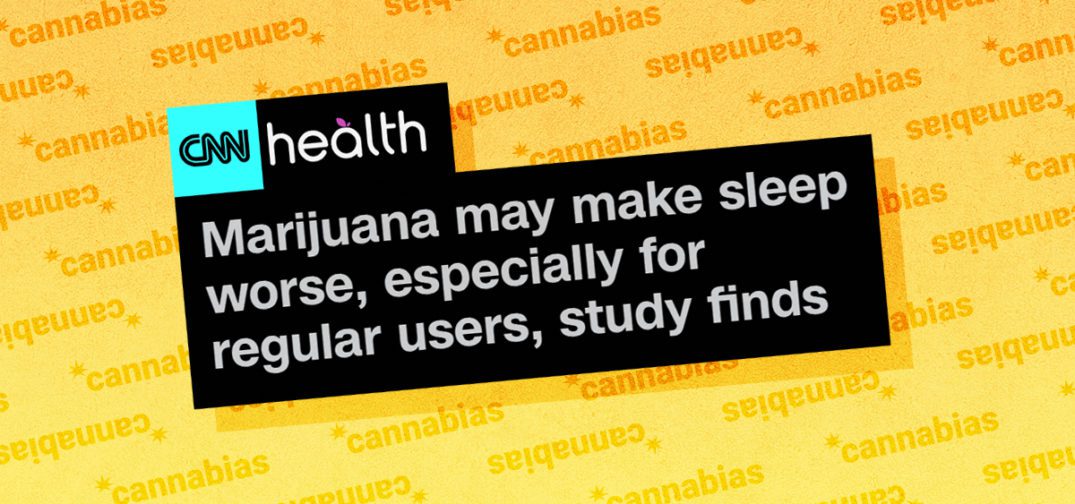A Dec. 6, 2021 CNN article boasts the headline “Marijuana may make sleep worse, especially for regular users, study finds;” yet midway through provides a more accurate line that should have informed the header – that there is “no clear evidence either way” that cannabis actually makes sleep worse. CNN kind of has a penchant for skewing their cannabis coverage and that trend continues in this piece focused on a sleep-and-cannabis-related study.
Presence of bias:
From the context bias in the alarmist headline to the tone bias in the second subheader (“Still, people continue to believe that weed is helping their sleep,”) CNN is making claims it later walks back and uses a negative tone in its description of how cannabis, anecdotally, helps some people.
The statement midway through the article from lead study author Calvin Diep, a resident in the department of anesthesiology and pain medicine at the University of Toronto, noted that there is a disconnect between what cannabis consumers report and evidence behind it, which is empirically true, but most non-cannabis industry reporters seem to forget that cannabis research has been outlawed since the enaction of prohibition. The statement from Diep should not be buried midway through the article (an example of structural bias) but rather should appear in the first couple of graphs.
The article also cites several people who were not involved in any way with the study, which can be a great way to balance study-related stories; however, CNN runs a quote from Bhanu Prakash Kolla, a sleep medicine specialist in the Center for Sleep Medicine at the Mayo Clinic, that claims cannabis consumers who stop regular use experience sleep disruptions due to withdrawal symptoms. It should be noted that Kolla is not an expert on cannabis, and the assertion about “withdrawal symptoms” should be taken with a grain of salt – and certainly not published without additional supporting evidence or context. The choice to only use medical experts who do not specialize in cannabis amounts to gatekeeping bias.
The article also makes the suggestion that cannabis is more potent now than ever before – a claim which is not backed by science, as we only know the actual cannabinoid concentrations of cannabis products now that it has been legalized. Our parents may say, “this is a lot stronger than what I smoked back in the seventies,” but the truth is there is no way to tell, honestly, whether cannabis cultivated during prohibition was weaker than what is available now. Making this claim is also an example of adjective bias.
And as usual, deep within the piece is where the chosen headline is fully revealed as clickbait. The author closes with a quote from Dr. Karim Ladha, staff anesthesiologist and clinician-scientist in the department of anesthesiology and pain medicine at the University of Toronto, who provides perhaps the most honest quote in the whole article, which would have made for a much better headline: “The studies just give us the possibilities that (marijuana) could hurt your sleep, but it may help and so we just don’t know until you try it.”
An article free of bias will never call cannabis “weed” or any other street name; second, if cannabis helps people sleep, then it helps people sleep. It’s not something they “believe” – it’s their experience as consumers. A simple baseline for quality reporting is to avoid implying something with words such as “still.” The headline is misleading; just look a few graphs into the piece and you’ll find your baseline for an objective headline. To their credit, CNN’s use of the word “cannabis” (13) outpaced “marijuana” (9) and “weed” (8) but the organization still has a lot of work to do when covering cannabis, as their clickbait-style headlines on the topic tend to tilt toward the anti-cannabis camp.
How to remedy:
CNN should avoid make sweeping generalizations, whether it be about the potency of cannabis or via phrases such as “people continue to believe.” Maybe find some people who actually use cannabis for sleep and get their take? Scientists and researchers can add balance, but they are going to try and stick to what they know (their experiences) and not including the voices of any consumers does this piece a great disservice. And enough with using “weed” as a synonym for cannabis in your reporting, especially when it’s painfully obvious that you don’t have any real familiarity with the plant.
Get daily cannabis business news updates. Subscribe
End
